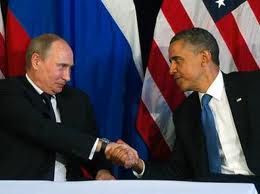The United States and Russia unveiled an ambitious plan to eliminate Syria’s chemical weapons by mid-2014, sparking a diplomatic drive Sunday to secure broad international backing for the deal.
 The United States and Russia unveiled an ambitious plan to eliminate Syria's chemical weapons by mid-2014, sparking a diplomatic drive Sunday to secure broad international backing for the deal.
The United States and Russia unveiled an ambitious plan to eliminate Syria's chemical weapons by mid-2014, sparking a diplomatic drive Sunday to secure broad international backing for the deal.
The landmark agreement, announced in Geneva on Saturday, left the door open to unspecified sanctions if Damascus fails to comply, and was swiftly hailed by the West.
However it was equally swiftly rejected by Syrian opposition armed groups who warned it would not halt the bloodshed in the conflict that has killed more than 110,000 people and displaced millions in two and a half years.
Under the accord struck in three days of talks in Geneva between US Secretary of State John Kerry and his Russian counterpart Sergey Lavrov, Syrian President Bashar al-Assad now has a week to hand over details of his stockpile.
Kerry said Assad's government must also provide "immediate and unfettered" access to inspectors from the Organization for the Prohibition of Chemical Weapons (OPCW).
"The inspectors must be on the ground no later than November... and the goal is to establish the removal by halfway through next year," said Kerry Saturday, flanked by Lavrov.
Kerry said the agreed steps would be encapsulated in a UN Security Council resolution drawn up under Chapter Seven of the organization's charter, which provides for enforcement through sanctions.
Lavrov hailed the accord as an "excellent" agreement "whose significance is hard to overestimate."
Kerry flies to the Zionist entity on Sunday to brief Prime Minister Benjamin Netanyahu about the deal and discuss the Israeli-Palestinian peace process, kicking off a flurry of diplomatic activity.
He will travel to Paris for a Monday meeting with French counterpart Laurent Fabius and British Foreign Secretary William Hague, as well as the Saudi Foreign Minister Saud al-Faisal.
Meanwhile, French Foreign Minister Laurent Fabius will visit veto-wielding China on Sunday to discuss Syria.
On his way back, Fabius will hold talks on Tuesday with Lavrov amid an intense few days of negotiations between the permanent members of the Security Council.
Washington and Moscow hope to secure a political transition to end the conflict that began in March 2011.
EU foreign policy chief Catherine Ashton offered the bloc's help with "securing sites and in dismantling and destroying certain chemical agents."
NATO in turn welcomed the agreement, saying that "full and unreserved Syrian compliance is now key."
UN chief Ban Ki-moon said that a UN inspectors' report due to be published on Monday would provide "overwhelming" confirmation that chemical weapons were used on August 21, without specifying the party that used them.